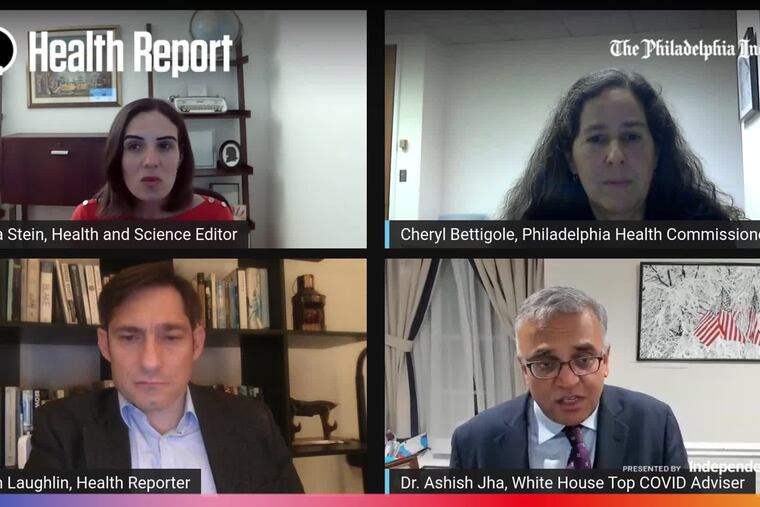What the White House COVID chief and Philly health commissioner think about free COVID tests, masking, and the ‘tridemic’ winter
The Biden administration is once more making some free COVID-19 tests available to all U.S. households as it unveils its contingency plans for potential coronavirus surges this winter.

The White House is again offering to ship free COVID-19 tests to households in Philadelphia and across the nation and urging people to get the latest vaccine as part of an effort to curb a winter case surge.
Ashish Jha, White House COVID response coordinator, said during an Inquirer Live Health Report on Thursday that the United States now has the tools to prevent a recurrence of the wave of sickness and death that marked the end of 2021.
“The virus, while still out there, still causing significant damage, is not the same disruptive force that it was,” he said.
» READ MORE: Empty cold-medicine shelves in pharmacies are adding stress to parents amidst a ‘tridemic’
COVID-19 cases and hospitalizations have been rising in the Philadelphia region in recent weeks ahead of the official start of winter, mirroring nationwide trends. The latest case numbers in Pennsylvania are the highest reported since March, when the omicron variant was spreading widely.
Although the average number of daily deaths has increased sharply across America, cases, hospitalizations, and deaths were all much higher last winter.
Bringing back free tests, which the Biden administration had previously discontinued, is central to the strategy the White House released Thursday. During his interview with The Inquirer, Jha laid out the plan’s priorities: Make tests and vaccines more available, with an emphasis on boosting protections for nursing homes, where some of the most at-risk people live.
“It’s a multiprong strategy but with a very specific goal, which is we do not want this winter to look like what last winter looked like,” he said.
The White House plan
After a three-month hiatus, the administration made four rapid virus tests available per household through covidtests.gov starting Thursday. COVID-19 cases have shown a marked increase after the Thanksgiving holiday, and further increases are projected from indoor gatherings and travel around Christmas and New Year’s.
» READ MORE: Flu, COVID, and RSV have strained Philly hospitals. Is the ‘tridemic’ our new normal?
The administration is putting personnel and equipment on standby should they be needed to help overwhelmed hospitals and nursing homes, as was necessary in earlier waves of the virus. So far, there have been no requests for assistance, but surge teams, ventilators, and personal protective equipment are ready, the White House said.
The Biden administration is also urging states and local governments to do more to encourage people to get the updated bivalent COVID-19 vaccines, which scientists say are more effective at protecting against serious illness and death from the currently circulating variants, although experts have differing views of how much of a difference they will make in generally healthy, younger Americans.
The administration is reiterating best practices to nursing homes and long-term care facilities for virus prevention and treatment and is urging administrators as well as governments to encourage vulnerable populations to get the new shots.
Masks at school
Philadelphia Health Commissioner Cheryl Bettigole, who also participated in the Inquirer Live discussion, said she strongly supports a decision announced Thursday by the Philadelphia School District that students returning from winter break will be required to wear a mask in schools for 10 days.
“What they’re trying to do is what we want them to do, to keep kids in school and if kids have COVID they can’t come to school,” she said.
» READ MORE: Philadelphia schools will require masking for 10 days after winter break
Earlier this month, CDC Director Rachel Walensky encouraged people to wear masks in crowded indoor settings and on public transportation. The CDC and White House did not recommend mandating masking.
Jha said that while the evidence that a high-quality, well-fitted mask reduces transmission is clear, he thinks policy decisions should be up to local governments.
Bettigole also encouraged Philadelphians to wear masks on public transportation and in crowded indoor places, but said the city is not considering resuming a wider mask mandate.
The future of COVID
The White House COVID chief reflected on living with the virus into the future.
When it comes to long-term solutions for living with COVID, Jha noted that infrastructure investments that can improve indoor air quality have not received enough attention.
“Most experts believe that if we make some basic investments in indoor air quality, we can reduce all respiratory infections by 30%, 60%, even 80%,” Jha said. “This is probably the most important long-term thing we can be doing.”
» READ MORE: Can I give my kid expired Tylenol? A pediatrician’s tips for the cold medicine shortage
He called the mistrust in vaccines one of the biggest challenges for the future of public health — a seeming disconnect given that we live in what Jha called “the golden age of vaccines.”
In Philadelphia, a small fraction of the people who received the first COVID shot have received the new bivalent booster, which is intended to provide specific protection against the latest omicron variant. Uptake is also low among the 65-and-older population, which is at highest risk for severe illness and death.
“It’s going to be a very odd period of time where we’re developing better vaccines and many people will not be using them,” Jha said. “Figuring out how to rebuild that confidence in vaccines is going to be one of the biggest public health challenges we have.”
The Associated Press contributed to this article.
» READ MORE: Watch the full Inquirer Live Health report panel on the future of COVID & Public Health